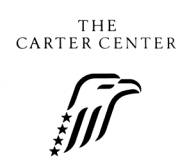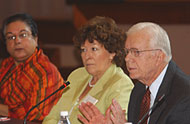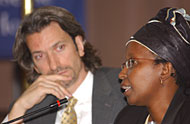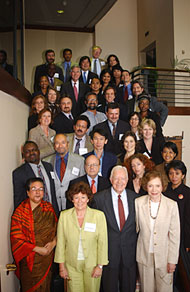

FOR IMMEDIATE RELEASE
CARTER CENTER
CONTACT: Kay Torrance
404-420-5129
kay.torrance@emory.edu
HUMAN RIGHTS FIRST
CONTACT: Nicky Lazar
212-845-5220
lazarn@humanrightsfirst.org
ATLANTA….The Carter Center and Human Rights First hosted the second conference in a series titled "Human Rights Defenders on the Frontlines of Freedom: Advancing Security and the Rule of Law," with former U.S. President Jimmy Carter and U.N. High Commissioner for Human Rights Louise Arbour as co-chairs, U.N. Special Representative for Human Rights Defenders Hina Jilani, human rights defenders from 14 nations, and representatives from major U.S. human rights organizations.
With several dozen innocents killed every week, either in Afghanistan or Iraq, horrible acts of terrorism cry out for concerted international action to control these threats to peace. There was unanimous agreement, however, that the necessary war against terrorism is being used as a pretext for restricting freedoms in many countries, including the United States, and for silencing and targeting human rights defenders. This state of emergency condones despotic acts by governments around the world if the perpetrators claim to be partners in the U.S. fight against terrorism. All too often, government leaders claim the right to investigate allegations of their own abuses, leading to impunity.
It is obvious there is a global need to ensure a proper balancing act, knowing that human rights abuses in the name of counterterrorism often help to conceal or generate more terrorism. In fact, combating terrorism, defending human rights, and ensuring our collective security go hand in hand.
With regard to the United States, despite President George W. Bush's bold reminder that America is determined to promote freedom and democracy around the world, the U.S. continues to suffer terrible embarrassment and a blow to our reputation as a champion of human rights because of reports concerning abuses of prisoners in Iraq, Afghanistan, and Guantánamo.
To demonstrate clearly our nation's historic commitment to protect human rights, our government needs to:
It is not fair to single out the United States for sole criticism because there are many serious abuses in other countries. All free nations should unite in condemnation of those countries guilty of such abuses, with the Universal Declaration of Human Rights as the standard.
We heard concerns from human rights defenders about the policies of various governments around the world, including the following examples:
A delegation of human rights defenders from around the world will proceed to Washington on Wednesday to present their testimony to key leaders of the U.S. government and to the news media. Worldwide, defenders must be substantively involved in policy debates because they provide a bridge between calls for freedom and democracy and the reality of implementation.
Global and National Trends Affecting the Protection of Human Rights: A Discussion Document
####
The Carter Center was founded in 1982 by former U.S. President Jimmy Carter and his wife, Rosalynn, in partnership with Emory University, to advance peace and health worldwide. A not-for-profit, nongovernmental organization, the Center has helped to improve life for people in more than 65 countries by resolving conflicts; advancing democracy, human rights, and economic opportunity; preventing diseases; improving mental health care; and teaching farmers to increase crop production. Please visit www.cartercenter.orgto learn more about The Carter Center.
Human Rights First is a leading human rights advocacy organization based in New York City and Washington, DC. Since 1978, we have worked in the U.S. and abroad to create a secure and humane world-advancing justice, human dignity, and respect for the rule of law. All of our activities are supported by private contributions. We accept no government funds. Visit our Web site: www.humanrightsfirst.org

Carter Center Photos: A. Poyo
President Jimmy Carter with co-chair and U.N. High Commissioner for Human Rights Louise Arbour (c.), and Hina Jilani (l.), U.N. Special Representative to the Secretary General on Human Rights Defenders.

Kaari Betty Murungi (right) of Kenya, director of Urgent Action Fund-Africa, addresses the conference as John Prendergast, special adviser to the President of the International Crisis Group looks on.

Human rights defenders from 14 nations, and representatives from major U.S. human rights organizations participated in the June 6-7 event at The Carter Center.
Please sign up below for important news about the work of The Carter Center and special event invitations.